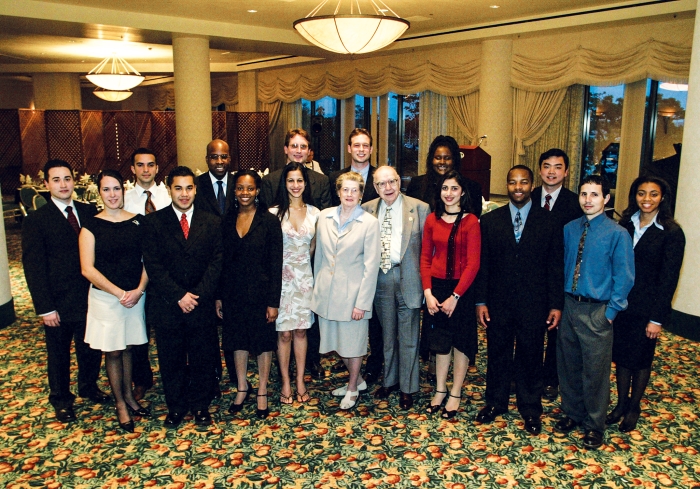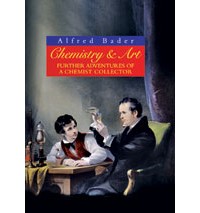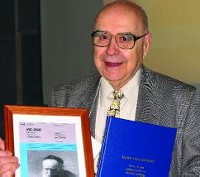Advertisement
Grab your lab coat. Let's get started
Welcome!
Welcome!
Create an account below to get 6 C&EN articles per month, receive newsletters and more - all free.
It seems this is your first time logging in online. Please enter the following information to continue.
As an ACS member you automatically get access to this site. All we need is few more details to create your reading experience.
Not you? Sign in with a different account.
Not you? Sign in with a different account.
ERROR 1
ERROR 1
ERROR 2
ERROR 2
ERROR 2
ERROR 2
ERROR 2
Password and Confirm password must match.
If you have an ACS member number, please enter it here so we can link this account to your membership. (optional)
ERROR 2
ACS values your privacy. By submitting your information, you are gaining access to C&EN and subscribing to our weekly newsletter. We use the information you provide to make your reading experience better, and we will never sell your data to third party members.
ACS News
Alfred Bader dies at age 94
Chemist, art collector, and philanthropist remembered for his impact on chemistry and his legacy of giving
by Linda Wang
December 25, 2018

Alfred R. Bader, best known for cofounding Aldrich Chemical (which merged with Sigma Chemical to form Sigma-Aldrich), died on Dec. 23 in Milwaukee, Wisconsin.
In addition to his entrepreneurial ventures, he and his wife, Isabel, have given millions of dollars to support the American Chemical Society’s Project SEED program, which provides scholarships to economically disadvantaged high school students to conduct hands-on research.
“Through his specialty chemicals company, Alfred made research more productive and rewarding for generations of chemists all over the world. Through his extraordinary philanthropy to ACS and numerous other institutions, such as Queen’s University in Canada, his legacy will live on forever in the lives he changed,” says Madeleine Jacobs, a longtime friend who worked closely with the Baders when she was executive director and CEO of the American Chemical Society. “His personal story and lifetime love of his devoted wife Isabel and sons is a testament to his boundless perseverance, optimism, and humanity in the face of extraordinary odds.”
“Chemists worldwide, even those who met Alfred briefly, are bowing their heads and giving thought to the tremendous effect he has made in their work, their lives, and chemistry overall,” says Victor A. Snieckus, professor and Bader Chair Emeritus at Queens University at Kingston.
Born in 1924 in Vienna to Jewish parents, Bader and his family escaped to England in 1938 as the Nazis took over Austria. A year later, Bader was deported from England and sent to Canada, where he was interned at a prisoner-of-war camp. A year and a half later, he was released and enrolled at Queen’s University at Kingston. He earned a BS in engineering chemistry from Queen’s University in 1945 and a PhD in chemistry from Harvard University in 1950. He founded Aldrich Chemical in 1951.
“He was tremendously bold and hardworking, and he had a marvelous life,” says Dudley R. Herschbach, professor of chemistry at Harvard University, who has reviewed two of Bader’s memoirs. “He created the world’s largest supplier of research chemicals, and it started out of a garage. The notion for it emerged from his experiences as a graduate student. He clearly had spunk.”
“I got to know Alfred when I started my business as a young entrepreneur,” says Michael Strem, founder of Strem Chemicals. “He became a mentor and inspiration to me and was gracious enough to serve on my board of directors during those early years. His input and expertise were great assets to the life of my company.”
“He was an extraordinary philanthropist, supporting education and the arts, and his impact will be felt for generations to come,” says Mary Kirchhoff, executive vice president for scientific advancement at ACS. “Alfred and his wife Isabel have been strong supporters of Project SEED. Their generosity enabled numerous high school students from economically disadvantaged backgrounds to gain hands-on laboratory experience and give them the confidence, through their research experience, to succeed in college.”
Bader was also a preeminent art collector, particularly of 17th-century Dutch paintings. In addition, the Baders have supported his eponymous ACS national award, the Alfred Bader Award in Bioinorganic or Bioorganic Chemistry. He is survived by his wife, Isabel, sons, David and Daniel, and seven grandchildren.
CORRECTION:
This story was updated on Dec. 27, 2018, to correct Bader’s date of death.







Join the conversation
Contact the reporter
Submit a Letter to the Editor for publication
Engage with us on Twitter